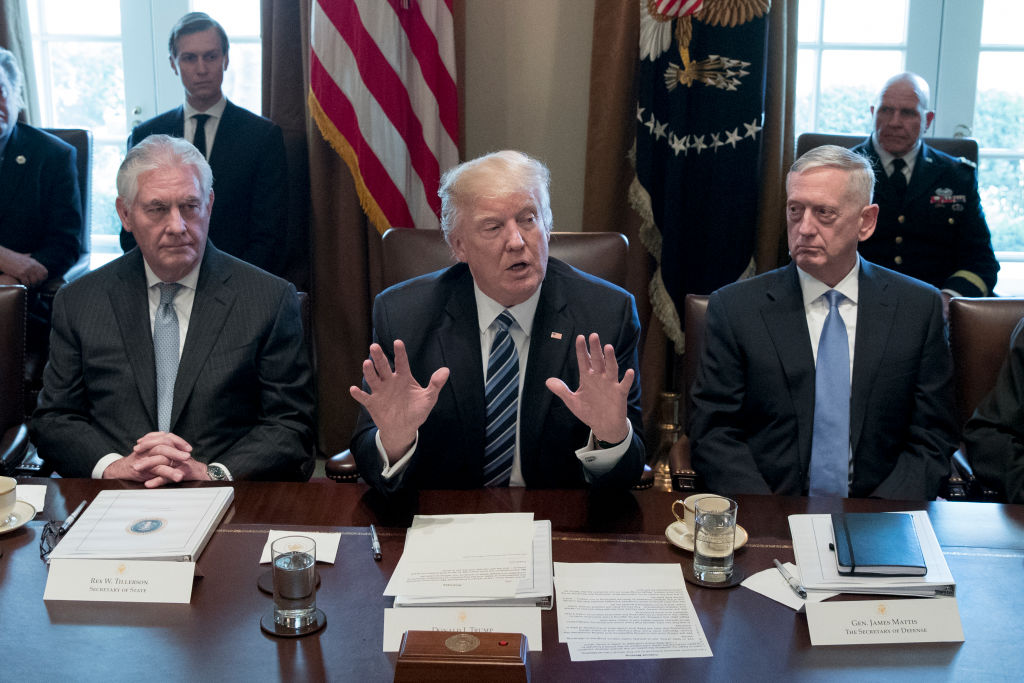Pentagon leaders have reportedly given their White House political overseer a Soviet-era nickname


A free daily email with the biggest news stories of the day – and the best features from TheWeek.com
You are now subscribed
Your newsletter sign-up was successful
Most members of President Trump's Cabinet do not have senior leadership teams or top deputies in place amid historically slow nominating and hiring of White House appointees, "but they do have an influential coterie of senior aides installed by the White House who are charged — above all — with monitoring the secretaries' loyalty," The Washington Post reported Sunday, citing "eight officials in and outside the administration." The Post called the arrangement "unusual," and some of those political liaisons, called White House senior advisers, have apparently overstayed their welcome.
At the Environmental Protection Agency, for example, Don Benton — a former Washington state senator who ran Trump's campaign in the state — offered his unsolicited opinion on policy matters so frequently that EPA Administrator Scott Pruitt has reportedly disinvited him from meetings, in a situation one official described to The Post as out of an episode of Veep. Pentagon officials privately call Brett Byers, charged with keeping an eye on Defense Secretary James Mattis, "the commissar," The Post reports, helpfully explaining that the nickname is "a reference to Soviet-era Communist Party officials who were assigned to military units to ensure their commanders remained loyal."
Most of these political overseers, placed near the Cabinet secretary's office in every department, have little expertise in the subject matter handled at their assigned agencies — Frank Wuco at Homeland Security, for example, plays a fictional jihadist on YouTube to illustrate his blogged contention that Islam is the root of the terrorist threat — and some observers expect their influence to wane once the departments get staffed up. Also, some Cabinet secretaries have been more welcoming of their White House liaisons.
The Week
Escape your echo chamber. Get the facts behind the news, plus analysis from multiple perspectives.

Sign up for The Week's Free Newsletters
From our morning news briefing to a weekly Good News Newsletter, get the best of The Week delivered directly to your inbox.
From our morning news briefing to a weekly Good News Newsletter, get the best of The Week delivered directly to your inbox.
Trump allies argue that the arrangement is necessary for a new president from a different party — though none of Trump's three predecessors employed a similar system. Former House Speaker Newt Gingrich, who still advises Trump, describes the political monitors as part of Trump's pledge to root out corruption in Washington — in this case, the "swamp" would be career bureaucrats and not, say, lobbyists. "If you drain the swamp, you better have someone who watches over the alligators," he said. "These people are actively trying to undermine the new government." You can read more, including what some experts see as the likely outcome of this system, at The Washington Post.
A free daily email with the biggest news stories of the day – and the best features from TheWeek.com
Peter has worked as a news and culture writer and editor at The Week since the site's launch in 2008. He covers politics, world affairs, religion and cultural currents. His journalism career began as a copy editor at a financial newswire and has included editorial positions at The New York Times Magazine, Facts on File, and Oregon State University.
-
 The ‘ravenous’ demand for Cornish minerals
The ‘ravenous’ demand for Cornish mineralsUnder the Radar Growing need for critical minerals to power tech has intensified ‘appetite’ for lithium, which could be a ‘huge boon’ for local economy
-
 Why are election experts taking Trump’s midterm threats seriously?
Why are election experts taking Trump’s midterm threats seriously?IN THE SPOTLIGHT As the president muses about polling place deployments and a centralized electoral system aimed at one-party control, lawmakers are taking this administration at its word
-
 ‘Restaurateurs have become millionaires’
‘Restaurateurs have become millionaires’Instant Opinion Opinion, comment and editorials of the day
-
 NIH director Bhattacharya tapped as acting CDC head
NIH director Bhattacharya tapped as acting CDC headSpeed Read Jay Bhattacharya, a critic of the CDC’s Covid-19 response, will now lead the Centers for Disease Control and Prevention
-
 Witkoff and Kushner tackle Ukraine, Iran in Geneva
Witkoff and Kushner tackle Ukraine, Iran in GenevaSpeed Read Steve Witkoff and Jared Kushner held negotiations aimed at securing a nuclear deal with Iran and an end to Russia’s war in Ukraine
-
 Pentagon spokesperson forced out as DHS’s resigns
Pentagon spokesperson forced out as DHS’s resignsSpeed Read Senior military adviser Col. David Butler was fired by Pete Hegseth and Homeland Security spokesperson Tricia McLaughlin is resigning
-
 Judge orders Washington slavery exhibit restored
Judge orders Washington slavery exhibit restoredSpeed Read The Trump administration took down displays about slavery at the President’s House Site in Philadelphia
-
 Hyatt chair joins growing list of Epstein files losers
Hyatt chair joins growing list of Epstein files losersSpeed Read Thomas Pritzker stepped down as executive chair of the Hyatt Hotels Corporation over his ties with Jeffrey Epstein and Ghislaine Maxwell
-
 Judge blocks Hegseth from punishing Kelly over video
Judge blocks Hegseth from punishing Kelly over videoSpeed Read Defense Secretary Pete Hegseth pushed for the senator to be demoted over a video in which he reminds military officials they should refuse illegal orders
-
 Trump’s EPA kills legal basis for federal climate policy
Trump’s EPA kills legal basis for federal climate policySpeed Read The government’s authority to regulate several planet-warming pollutants has been repealed
-
 House votes to end Trump’s Canada tariffs
House votes to end Trump’s Canada tariffsSpeed Read Six Republicans joined with Democrats to repeal the president’s tariffs
